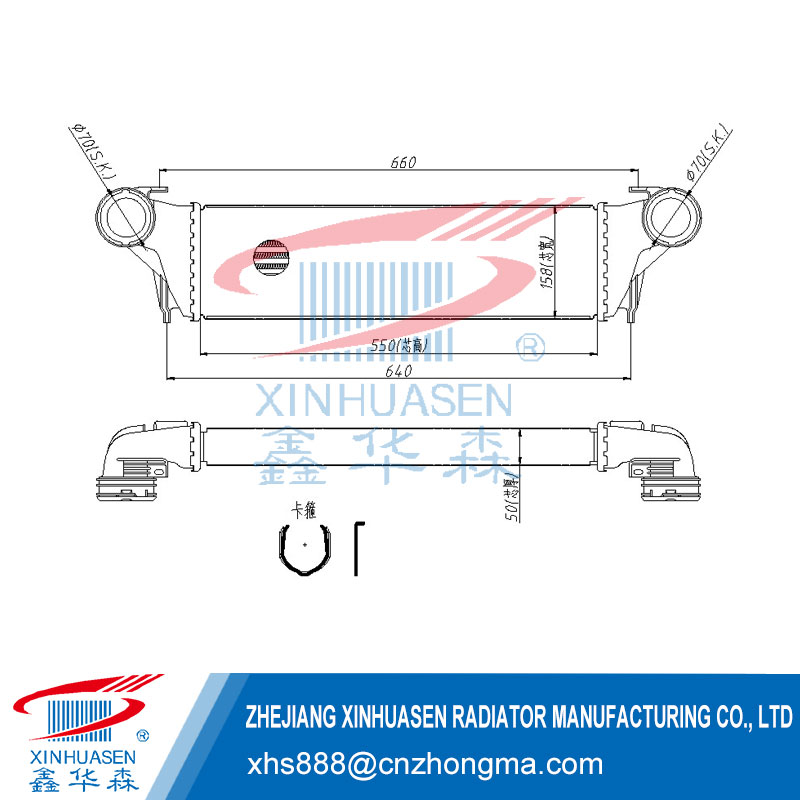Engineered Excellence: Unveiling the Materials of OE 17517791231 Car Intercooler for BMW X5
2024-01-18
Introduction:
As vehicles evolve, so do the components that contribute to their performance. The OE 17517791231 Car Intercooler, a vital element designed for the BMW X5, exemplifies this evolution through meticulous material selection. In this blog post, we delve into the materials used in the construction of the OE 17517791231 Car Intercooler, exploring their impact on durability and heat dissipation, crucial factors for optimizing engine performance.
1. Aluminum Core:
- At the core of the OE 17517791231 Car Intercooler is high-quality aluminum. Aluminum is chosen for its exceptional thermal conductivity, allowing efficient transfer of heat away from the compressed air passing through the intercooler. This lightweight yet durable material plays a pivotal role in optimizing heat dissipation.
2. End Tanks:
- The end tanks of the OE 17517791231 Car Intercooler are also crafted from aluminum. These end tanks are integral components that facilitate the smooth flow of air through the intercooler. Aluminum's corrosion resistance and lightweight nature contribute to the longevity and overall efficiency of the intercooler.
3. Bar-and-Plate Construction:
- The OE 17517791231 Car Intercooler features a bar-and-plate construction, a design that enhances both strength and thermal performance. This construction style allows for robustness in handling high-boost applications while providing an efficient heat exchange process for optimal cooling.
4. Thermal Conductivity:
- The choice of materials, particularly aluminum, reflects a commitment to high thermal conductivity. Aluminum's ability to conduct heat efficiently ensures that the OE 17517791231 Car Intercooler effectively dissipates the heat generated during the compression of air by the turbocharger, preventing heat soak and maintaining consistent performance.
5. Corrosion Resistance:
- Aluminum is renowned for its corrosion resistance, making it an ideal material for components exposed to varying environmental conditions. The OE 17517791231 Car Intercooler, with its aluminum construction, resists corrosion, ensuring durability and maintaining optimal performance over the lifespan of the vehicle.
6. Lightweight Design:
- The lightweight nature of aluminum contributes to the overall weight efficiency of the OE 17517791231 Car Intercooler. A lightweight intercooler minimizes the impact on the vehicle's weight distribution, promoting agility and responsiveness while maintaining the structural integrity required for high-performance applications.
7. Durability Under Pressure:
- The OE 17517791231 Car Intercooler operates in an environment where it experiences varying levels of pressure due to turbocharging. The chosen materials, especially the robust aluminum core, ensure durability under pressure, providing a reliable solution for BMW X5 models equipped with forced induction systems.
8. Resistance to Thermal Stress:
- The bar-and-plate construction, combined with aluminum's properties, enhances the intercooler's resistance to thermal stress. This means that the OE 17517791231 Car Intercooler can withstand the cyclic heating and cooling experienced during engine operation without compromising its structural integrity.
Conclusion:
The OE 17517791231 Car Intercooler exemplifies a harmonious blend of materials, with a focus on aluminum's thermal conductivity, corrosion resistance, and lightweight characteristics. This strategic material selection not only ensures the durability of the intercooler but also contributes to efficient heat dissipation, ultimately enhancing the performance of the BMW X5. As automotive enthusiasts seek components that strike the perfect balance between strength and thermal efficiency, the OE 17517791231 Car Intercooler stands as a testament to engineered excellence in material design.



